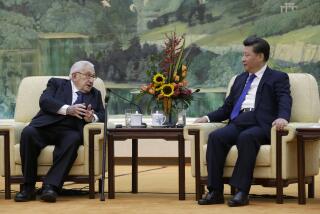China Is Old Hand at Election-Watching
- Share via
WASHINGTON — Newly declassified files show that when President Nixon sat down with Premier Chou En-lai during his historic 1972 visit to Beijing, the urbane Chinese leader came out squarely in favor of Nixon’s reelection.
“It is our hope that you will be able to continue in office . . . ,” Chou told the American president, according to the transcripts of their secret meetings. “It is also our hope that Dr. [National Security Advisor Henry A.] Kissinger, too, will remain with you to help, Mr. President, in your work.”
And the Chinese premier, sitting in Beijing’s Great Hall of the People, voiced a few minutes later one more hope for what should happen after Nixon regained the White House. “It would be good if the liberation of Taiwan [that is, its return to China] could be realized in your next term of office.”
The new records show that China’s interest in American elections did not start with President Clinton in 1996. Rather, it has been an important part of Chinese-American diplomacy since the start of rapprochement between the two countries during the Nixon administration.
For the last 27 years, the transcripts of Nixon’s extensive talks with Chou have remained secret. They were not available when the records of many of Kissinger’s meetings with Chinese leaders were published in a book earlier this year.
But in mid-March, the transcripts of the Nixon-Chou conversations were declassified and released to the National Security Archive, a Washington-based group that seeks access to government records.
These transcripts are the most valuable single account of the secret diplomacy conducted during Nixon’s groundbreaking trip. The sessions between Nixon and Chou, which took place over five days in both Beijing and Shanghai, covered all the serious business conducted between America and China at the time.
Nixon met only once for an hour with Mao Tse-tung, China’s top leader, but their conversation was rambling and vague. By contrast, Nixon and Chou conducted 13 hours of talks and discussed everything from Taiwan, Vietnam and American politics to Japan, India, Korea and the Soviet Union.
The newly declassified files confirm earlier reports that Nixon promised Chou he would try to limit the growing power of Japan, which was then in the early stages of its rise as an economic superpower.
“We will, to the extent we are able, use our influence to discourage Japan from moving into Taiwan as our presence becomes less,” the American president promised at one point, according to the transcript.
U.S. officials deleted the portion of the transcript that follows. But the handwritten notes that Nixon made before the meeting show that he planned to suggest the United States would attempt to restrict Japan’s influence in other Asian countries, such as South Korea and Indonesia.
Concerning Taiwan, Nixon was willing to give Chou the impression that the United States might not object to China taking over the island and its Nationalist government, so long as the resolution was peaceful.
“We are not asking you to remove Chiang Kai-shek. We will take care of that ourselves,” Chou told Nixon at one point, referring to the Nationalist Chinese leader.
“Peacefully,” Nixon replied.
Nixon told Chou that his goal was normal relations between the United States and China. “If I should win the election, I have five years to achieve it,” he said.
“I cannot . . . now make a secret deal and shake hands and say that within the second term, it [normalization] will be done. If I did that, I would be at the mercy of the press if they asked the question. I don’t want to say that.” Nixon resigned in 1974 and the United States did not establish diplomatic relations with China until the Jimmy Carter administration in 1979.
Not all of the Nixon-Chou conversations were about foreign policy. At one point, after noting that former Chinese Foreign Minister Chen Yi had died of cancer, Chou suddenly asked Nixon: “Do you have a cure for cancer?”
Nixon said that his administration was supporting a “massive research program” to find a cure. Chou, who would himself die of cancer a few years later, suggested that the United States and China should cooperate in their research.
*
The full set of newly declassified transcripts will be available this week on the Internet at www.seas.gwu.edu/nsarchive.
More to Read
Sign up for Essential California
The most important California stories and recommendations in your inbox every morning.
You may occasionally receive promotional content from the Los Angeles Times.













